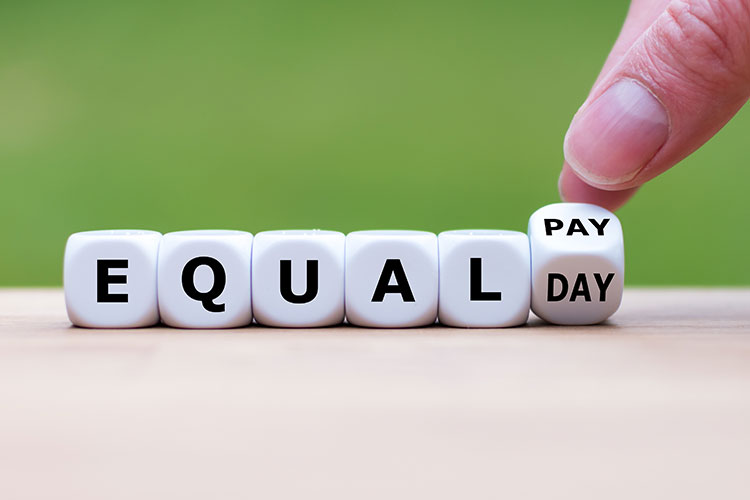According to the 2021 Global Gender Gap Report, prepared annually by the World Economic Forum, the gender gap in economic participation and opportunity will take 267.6 years to close worldwide. One of the sources of this inequality, besides female underrepresentation in the labor market, is the overall gender income disparities. Gender wage discrimination is widespread globally, where women are paid less than men for work of equal value. Pay equity is an essential factor to women’s economic empowerment and a prerequisite to an inclusive and prosperous economy. However, wage discrimination is based not only on gender but also on race and nationality. There have always been undervalued and underpaid jobs “to a large extent because of the gender and race of the people who hold them.” Bahrain is no different from this global trend. The government has to address pay inequality and set clear race and gender-neutral criteria for employers to follow in wage-setting.
The 2021 Global Gender Gap Report ranked Bahrain 137 out of 156 countries in the overall index and 134 in the sub-index of economic participation and opportunity. Although Bahrain has introduced several regulations to address wage discrimination, they have been largely ineffective and mostly with unclear implementation mechanisms. Article 39 of the Bahraini labor law in the private sector of 2012 prohibits “discrimination in wages based on sex, origin, language, religion or ideology.” On 27 August 2020, the Bahraini government issued Resolution No. 52 of 2020, setting out an outright prohibition on the discrimination of wages between male and female employees who hold the same job and work in similar conditions. The government has not disclosed how it intends to enforce these regulations. What are the measures in place to enforce pay transparency? What are the adopted diagnostic tools to help close the gender pay gap? What are the penalties for violators? What are the procedures and requirements for equal-pay litigation against employers, if any? Moreover, the statistical reports issued by Bahrain’s Social Insurance Organization (SIO) reflect grim reality, highlighting both nationality and gender pay gap in Bahrain.
According to the SIO second quarter statistical report of 2021, Bahraini men earned 876 BD monthly on average in the public sector, whereas Bahraini women earned 774 BD. The gender wage disparity is more evident in the private sector, where the average salary for Bahraini men is 855 BD and 603 BD for Bahraini women. Another expressive indicator of the overall gender labor inequality and income disparities is that non-Bahraini men who earn salaries range from 800-999 BD are five times the number of non-Bahraini women who earn this wage, while the number of non-Bahraini men paid equal or above 1000 BD are at least seven times the number of non-Bahraini women with the same income.
The SIO report also highlights race or nationality-based pay inequalities. Non-Bahraini workers of different ages earn less than Bahrainis in the same age groups. On average, migrant workers earn about 30 percent of the wages of nationals in Bahrain’s labor market, meaning that 77.56 percent of Bahrain labor force, which is the proportion of migrant workers, are earning about 70 percent less than 22.43 percent, which is the proportion of nationals in the labor market, according to the Labor Market Regulatory Authority statistics on labor force composition in Bahrain. Although this percentage does not directly represent pay inequality as there is no data about the job categories in the SIO report besides migrant workers are usually recruited in low-skilled jobs in the country, these stark income disparities between Bahraini and non-Bahraini workers are the manifestation of epidemic social injustice; besides, other government reports clearly expose wage discrimination. The report of the first quarter of 2021 issued by the Labor Market Regulatory Authority indicated that the wage gap between national and non-national workers was calculated to be 339 BD in the four major sectors recruiting migrant workers: construction, trade, hotels and restaurants, and small-scale manufacturing.
The government has not so far set a minimum wage to tackle these disparities. Setting a minimum wage contributes to social justice by narrowing the gap between different social classes. It also helps in establishing decent jobs, improves the living standards of low-income households, and addresses the gender-based wage gap, among other social and economic advantages. Yet, the government does not set minimum wage except for nationals in the public sector. As for other sectors, minimum wages are set through “de facto nationality-based wage scales” rather than valid objective criteria such as education, skills, experience, negatively affecting the principle of equal pay for work of equal value. This is especially true for migrant domestic workers (MDWs), where the standard contract adopted in 2017 failed to set a minimum wage, and they are paid based on their nationalities, depending on the minimum wage set by their respective embassies, if any. The fact that MDWs, who constitute 10.2 percent of the total Bahraini workforce and 36.6 percent of the total female workforce, are subjected to explicit gender and nationality-based wage discrimination indicates the inadequacy of government measures so far. It also requires the government to take bolder and serious steps to end this discrimination and fully recognize the contributions of women and migrant workers to Bahrain’s economy.
Based on the above, Bahrain Center for Human Rights calls on the government of Bahrain to:
- Adopt clear enforcement mechanisms for wage discrimination regulations.
- Set a minimum wage for national and non-national workers without discrimination.
- Introduce laws and regulations to end the legalized discrimination against MDWs and the underestimation of the value of their work.
- Encourage business owners and companies to hold the principle of equal pay for the work of equal value and promote pay equity measures, such as the conduct of equal pay audits.

